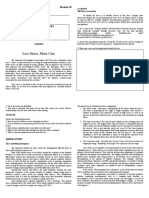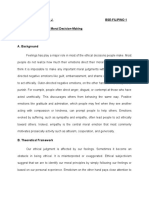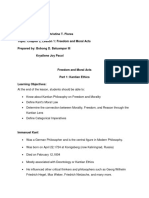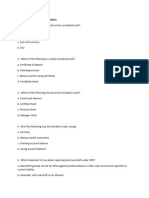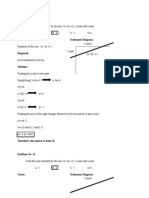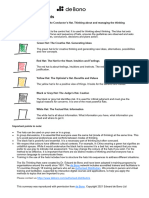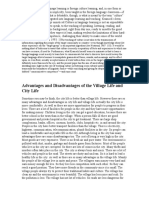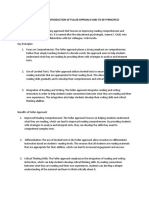0 ratings0% found this document useful (0 votes)
128 views4 The Digital Self
4 The Digital Self
Uploaded by
Javadd KilamThe document discusses the concept of the digital self and how people present themselves online. It notes that millennials grew up with technology and use social media as a way to express their identity. While technology provides opportunities, it also enables behaviors like online disinhibition where people act without restraint. People present themselves online to meet expectations, boost self-esteem, feel a sense of belonging, and express their ideal selves. However, expressing oneself too differently online compared to reality could cause problems by distorting what is real. The digital world allows for new expressions of identity but people should remember to stay grounded in reality.
Copyright:
© All Rights Reserved
Available Formats
Download as PPTX, PDF, TXT or read online from Scribd
4 The Digital Self
4 The Digital Self
Uploaded by
Javadd Kilam0 ratings0% found this document useful (0 votes)
128 views17 pagesThe document discusses the concept of the digital self and how people present themselves online. It notes that millennials grew up with technology and use social media as a way to express their identity. While technology provides opportunities, it also enables behaviors like online disinhibition where people act without restraint. People present themselves online to meet expectations, boost self-esteem, feel a sense of belonging, and express their ideal selves. However, expressing oneself too differently online compared to reality could cause problems by distorting what is real. The digital world allows for new expressions of identity but people should remember to stay grounded in reality.
Original Description:
the Digital Self
Original Title
4 the Digital Self
Copyright
© © All Rights Reserved
Available Formats
PPTX, PDF, TXT or read online from Scribd
Share this document
Did you find this document useful?
Is this content inappropriate?
The document discusses the concept of the digital self and how people present themselves online. It notes that millennials grew up with technology and use social media as a way to express their identity. While technology provides opportunities, it also enables behaviors like online disinhibition where people act without restraint. People present themselves online to meet expectations, boost self-esteem, feel a sense of belonging, and express their ideal selves. However, expressing oneself too differently online compared to reality could cause problems by distorting what is real. The digital world allows for new expressions of identity but people should remember to stay grounded in reality.
Copyright:
© All Rights Reserved
Available Formats
Download as PPTX, PDF, TXT or read online from Scribd
Download as pptx, pdf, or txt
0 ratings0% found this document useful (0 votes)
128 views17 pages4 The Digital Self
4 The Digital Self
Uploaded by
Javadd KilamThe document discusses the concept of the digital self and how people present themselves online. It notes that millennials grew up with technology and use social media as a way to express their identity. While technology provides opportunities, it also enables behaviors like online disinhibition where people act without restraint. People present themselves online to meet expectations, boost self-esteem, feel a sense of belonging, and express their ideal selves. However, expressing oneself too differently online compared to reality could cause problems by distorting what is real. The digital world allows for new expressions of identity but people should remember to stay grounded in reality.
Copyright:
© All Rights Reserved
Available Formats
Download as PPTX, PDF, TXT or read online from Scribd
Download as pptx, pdf, or txt
You are on page 1of 17
DIGITAL SELF
THE SELF IN THE DIGITAL
WORLD
THE MILLENNIAL GENERATION IS KNOWN TO BE THE
GENERATION OF DIGITAL NATIVES BECAUSE
MILLENNIALS WERE BORN IN AN ERA OF RAPID
TECHNOLOGICAL ADVANCEMENT. AS A RESULT, DAILY
LIFE IS ALMOST ALWAYS DEPENDENT ON THE
FUNCTIONS OF TECHNOLOGY, ESPECIALLY THE
INTERNET WHICH PROVIDES PEOPLE WITH A VENUE OF
PRESENTING THEIR IDENTIFIED THROUGH SOCIAL
MEDIA PLATFORMS.
THE ADVENT OF TECHNOLOGY COMES WITH A
CORRESPONDING CHALLENGE: TO ENSURE THAT
TECHNOLOGY IS USED PROPERLY. THIS IS THE ESSENCE OF
DIGITAL CITIZENSHIP, WHICH REFERS TO THE NORMS OF
APPROPRIATE AND RESPONSIBLE BEHAVIOUR TOWARDS
TECHNOLOGY USE. DIGITAL CITIZENSHIP IS ANCHORED IN 3
GENERAL PRINCIPLES: RESPECTING, EDUCATING, AND
PROTECTING ONESELF AND OTHERS. DIGITAL CITIZENSHIP
SERVES THE PURPOSE OR REGULATING HUMAN
BEHAVIOUR IN A HIGHLY-TECHNOLOGICAL AND DIGITAL
WORLD.
A MAJOR CONCERN OF LIVING IN THE DIGITAL ERA IS
HOW TECHNOLOGY SHAPES ONE’S SENSE OF SELF AND
IDENTITY. ONE CONCEPT THAT IS RELATED TO THE
CONCEPT OF THE DIGITAL SELF IS ONLINE DISINHIBITION.
IT IS DEFINED AS THE LACK OF RESTRAINT ONE FEELS
WHEN COMMUNICATING ONLINE IN COMPARISON TO
COMMUNICATING IN PERSON.
SOME INDIVIDUALS LOSE THEIR INHIBITION IN SOCIAL
INTERACTIONS BECAUSE THERE IS AN ASPECT OF BEING
PRESENT ONLY IN THE VIRTUAL, A SORT OF ANONYMITY.
ANONYMITY MAY SERVE AS AN OPTION FOR INDIVIDUALS
WHO ARE NATURALLY SHY AND INTROVERTED TO EXPRESS
THEIR THOUGHTS, WITHOUT THREAT TO THEIR SELF-
ESTEEM.
NOWADAYS, HOWEVER, PEOPLE ARE MORE INCLINED TO
SHOW THEIR OWN PERSONALITIES VIA ONLINE CHANNELS.
THE INTERNET BECOMES A MULTI-MEDIA VENUE FOR
SHOWCASING PERSONAL TRAITS, QUALITIES, AND EVEN
EXPERIENCES. THE VALUES AND BELIEFS HE/SHE UPHOLDS
ARE ALSO EXPRESSED IN HIS/HER ONLINE BEHAVIOR.
THUS, TECHNOLOGY, THROUGH THE DEVELOPMENT OF
VIRTUAL SPACES AND COMMUNITIES ACCESSIBLE
THROUGH THE INTERNET, CAN BE A BASIS OF EVALUATING
THE CONSISTENCY OF THE SELF.
THE PERMEATING NATURE OF TECHNOLOGY HAS ALSO
INFLUENCED VARIOUS TECHNOLOGICAL AND ONLINE
BEHAVIORS PEOPLE MANIFEST. WITHIN THE CONCEPT OF
DIGITAL CITIZENSHIP, THERE ARE 9 THEMES THAT COVER
THESE BEHAVIORS:
• DIGITAL HEALTH AND WELLNESS
• DIGITAL SECURITY
• DIGITAL RIGHTS AND RESPONSIBILITIES
• DIGITAL LITERACY
• DIGITAL LAW
• DIGITAL ACCESS
• DIGITAL COMMERCE
• DIGITAL COMMUNICATION
• DIGITAL ETIQUETTE
TECHNOLOGY OFFERS LIMITLESS OPPORTUNITIES; ITS
PRESENCE IS INEVITABLE. HOWEVER, TECHNOLOGY NEED
NOT CONTROL THE SOCIETY AND PEOPLE’S LIVES. AN
INDIVIDUAL MUST DEFINE HIMSELF/HERSELF BASED
SOLELY ON HIS/HER TERMS.
THE DIGITAL SELF: WHY DO WE EXPRESS
OURSELVES ON SOCIAL MEDIA LIKE WE
DO?
THE DEVELOPMENT OF THE DIGITAL SELF
THE IDEA OF THE DIGITAL SELF DEVELOPED FROM THE
ORIGINAL PHENOMENON OF THE ‘EXTENDED SELF’,
PIONEERED BY RUSSELL BELK IN 1988. HE BELIEVED OUR
POSSESSIONS ARE A MAJOR CONTRIBUTOR TO AND
REFLECTION OF OUR IDENTITIES. BACK IN THE DAY, IT WAS
EXTERNAL OBJECTS, SUCH AS CLOTHES, JEWELRY AND
CARS ETC. THAT HE BELIEVED WE USED AND CONSIDERED
AS PART OF OURSELVES. THINK ABOUT IT, COULD YOU LIVE
WITHOUT YOUR SMARTPHONE OR LAPTOP? (BE HONEST...)
WHY DO WE HAVE A DIGITAL SELF?
THE IDEA OF THE DIGITAL SELF IS AN INTERESTING AND
RELATIVELY NEW TOPIC DISCUSSED IN CONSUMER
BEHAVIOUR RESEARCH. RESEARCHERS, SUCH AS STONE
(1996) AND HEMETSBURGER (2005) CLAIM THAT THE
DIGITAL WEB ALLOWS US TO TRY OUT DIFFERENT
PERSONAS THAT DIFFER FROM OUR REAL LIFE IDENTITIES.
BUT WHY WOULD WE WANT TO EVEN DO THIS? WE WERE
ESPECIALLY INTERESTED IN LOOKING AT WHY WE EXPRESS
OURSELVES ONLINE THE WAY WE DO AND WE WANTED TO
SHARE THE MOST COMMON REASONS:
• WE WANT TO MEET THE EXPECTATION OF OTHERS: RESEARCH
SHOWS OVER 50% OF WOMEN WOULD EDIT THEIR SOCIAL MEDIA
PHOTOS TO LOOK BETTER AND MEET THE EXPECTATIONS THAT THE
MEDIA AND MAGAZINES HAVE SET
• WE WANT TO BOOST OUR SELF-ESTEEM: PEOPLE UPLOAD PHOTOS
AND STATUSES ONLINE THAT THEY FEEL WILL RECEIVE ‘LIKES’ AND
POSITIVE FEEDBACK IN WHICH ULTIMATELY HELPS THEIR EGOS
• TO FEEL A SENSE OF BELONGING: SOME OF US WANT TO FIT IN
WITH THE CROWD AND UPLOAD THINGS THAT ARE ‘DOWN WITH
THE TREND’ - FOR INSTANCE, WHO NOTICES THE AMOUNT OF
PEOPLE POSTING PICTURES OF THEIR FOOD INCREASING? IT DIDN’T
COME FROM NOWHERE.
• BIGGER SENSE OF FREEDOM: UNLIKE REAL LIFE,
DIGITAL PLATFORMS ALLOW US TO EXPRESS OURSELVES
IN ANY WAY WE WANT TO WITHOUT ANYONE THERE TO
PHYSICALLY JUDGE US
• STRIVING TO BE OUR IDEAL SELVES: DIGITAL APPS,
SUCH AS FACE TUNE, THAT ALLOW US TO IMPROVE OUR
APPEARANCES ON PHOTOS (THROUGH TEETH WHITENING,
SKIN SMOOTHING AND BODY SHAPE EDITING) HELPS
CONSUMERS TO EXPRESS AS THEIR ‘IDEAL’ SELF ONLINE
AND INEVITABLY FEEL BETTER ABOUT THEMSELVES
IN CONCLUSION, THE DIGITAL WORLD HAS PROVIDED US
WITH GREATER OPPORTUNITIES TO EXPRESS OUR IDENTITY
IN ANY FORM WE WANT TO. BUT WHAT WE ALL NEED TO
REMEMBER IS: HOW WILL WE FEEL IF WE GO SO FAR TO
EXPRESS OURSELVES DIFFERENTLY ONLINE THAT WE
FORGET WHAT REALITY IS, OR WORSE, WE END UP
RESENTING IT?
THANK YOU !!!
You might also like
- Geethic The Value of Philosophy by Bertrand RussellDocument2 pagesGeethic The Value of Philosophy by Bertrand Russellsam tNo ratings yet
- Symptoms of Autism in GirlsDocument8 pagesSymptoms of Autism in GirlsAutism Parenting100% (3)
- Digital Self: PPT By: CJ LaoDocument9 pagesDigital Self: PPT By: CJ LaoPaul Adrian AvecillaNo ratings yet
- Reporting EthicsDocument17 pagesReporting EthicsJabe neyNo ratings yet
- Good Citizenship Values and Youth Moral Recovery Program For Nation-BuildingDocument64 pagesGood Citizenship Values and Youth Moral Recovery Program For Nation-BuildingLewis BigalmeNo ratings yet
- Module 8 GE EthicsDocument7 pagesModule 8 GE EthicsCarl Luis AporadorNo ratings yet
- Chapter 2 Lesson 6 The Digital SelfDocument47 pagesChapter 2 Lesson 6 The Digital Selfenriquezalexandre17No ratings yet
- W12-Module 1 The Digital SelfDocument4 pagesW12-Module 1 The Digital SelfZoi SacoponNo ratings yet
- Understanding The Self Mod10Document8 pagesUnderstanding The Self Mod10Asher Sarceno100% (1)
- 4 Sociology and The SelfDocument51 pages4 Sociology and The SelfKathleen Anne Landar100% (1)
- Feelings and Moral Decision-MakingDocument9 pagesFeelings and Moral Decision-Makingroselyn ayensaNo ratings yet
- Activity: MYTH BUSTER: Module 1 - Digital Self - Page 1 of 6Document6 pagesActivity: MYTH BUSTER: Module 1 - Digital Self - Page 1 of 6Miss MegzzNo ratings yet
- Digital SelfDocument16 pagesDigital SelfJubilee Dela VictoriaNo ratings yet
- Chapter 1 - Nature of SelfDocument6 pagesChapter 1 - Nature of SelfSharmaine Gatchalian BonifacioNo ratings yet
- Digital SelfDocument18 pagesDigital SelfYou're Welcome100% (1)
- Digital 114219Document18 pagesDigital 114219cresline repollo cuyosNo ratings yet
- Mariano, Znyx Aleli J. Bse-Filipino 1 Module 9: Feelings and Moral Decision-Making A. BackgroundDocument5 pagesMariano, Znyx Aleli J. Bse-Filipino 1 Module 9: Feelings and Moral Decision-Making A. BackgroundZnyx Aleli Jazmin-MarianoNo ratings yet
- Reviewer Uts Finals EditedDocument8 pagesReviewer Uts Finals EditedRose Anne BautistaNo ratings yet
- Frameworks and Principles Behind Our Moral Disposition Virtue Ethics Immanuel KantDocument12 pagesFrameworks and Principles Behind Our Moral Disposition Virtue Ethics Immanuel KantTulungan Para sa Modular at Online Classes100% (1)
- CN 6147 Module - Freedom and Moral ActsDocument8 pagesCN 6147 Module - Freedom and Moral ActsBong D. Batuampar IIINo ratings yet
- ETHICSAcDocument16 pagesETHICSAcRichard Dan Ilao ReyesNo ratings yet
- Universal ValuesDocument14 pagesUniversal ValuesDhanielle Artch Tabile100% (1)
- Moral Responsibility and BlameDocument14 pagesMoral Responsibility and BlameBlack KnightNo ratings yet
- 2 Dilemma and Foundation of MoralityDocument11 pages2 Dilemma and Foundation of MoralityAbcd ReyesNo ratings yet
- The Material Economic SelfDocument16 pagesThe Material Economic SelfAngelica CervantesNo ratings yet
- Understanding The Self: Natural Processes OutcomeDocument5 pagesUnderstanding The Self: Natural Processes OutcomelapNo ratings yet
- 3 The Act EthicsDocument9 pages3 The Act EthicsKhiel YumulNo ratings yet
- Self Efficacy TheoryDocument14 pagesSelf Efficacy TheoryN-Dean Cabalfin100% (1)
- Osias Colleges Inc. F. Tanedo St. San Nicolas, Tarlac City Tel. No. 045-982-02-45 Learnng Activity SheetDocument2 pagesOsias Colleges Inc. F. Tanedo St. San Nicolas, Tarlac City Tel. No. 045-982-02-45 Learnng Activity SheetZacarias GarciaNo ratings yet
- Understanding The Self - SociologyDocument16 pagesUnderstanding The Self - SociologyJohnrogel IlinganNo ratings yet
- Activities Living in The IT EraDocument20 pagesActivities Living in The IT EraMa Jessa Kathryl Alar IINo ratings yet
- This Study Resource Was: Assessment TaskDocument1 pageThis Study Resource Was: Assessment TaskMaden betoNo ratings yet
- Ge 8-Ethics: Principles of Ethical Behavior in Modern SocietyDocument32 pagesGe 8-Ethics: Principles of Ethical Behavior in Modern SocietyRachel BautistaNo ratings yet
- WEEK1-2 - Foundations of EntrepreneurshipDocument22 pagesWEEK1-2 - Foundations of Entrepreneurshipaar4maryamNo ratings yet
- Moral Standards vs. Non-Moral Standards: Jensen DG. MañebogDocument1 pageMoral Standards vs. Non-Moral Standards: Jensen DG. Mañebogal ray compuestoNo ratings yet
- Cultural Relativism in EthicsDocument23 pagesCultural Relativism in Ethicskim rina100% (1)
- Psychological Perspective of The Self: Presented By: Pereyra, Dennis Batuhan, Edward Lanoy, Cerela MarieDocument22 pagesPsychological Perspective of The Self: Presented By: Pereyra, Dennis Batuhan, Edward Lanoy, Cerela MarieDennis PereyraNo ratings yet
- Challenges of Filinnials and Millennials 1st Sem 2023 2024Document11 pagesChallenges of Filinnials and Millennials 1st Sem 2023 2024Jessa Palma100% (1)
- 1 Ethics Its Meaning Nature and ScopeDocument26 pages1 Ethics Its Meaning Nature and ScopeLynlee Bebs T. ClavicillasNo ratings yet
- Freedom As Foundation For Moral ActsDocument18 pagesFreedom As Foundation For Moral ActsLeonel Dolendo100% (1)
- Lesson 2 GE 4 Purposive CommunicationDocument8 pagesLesson 2 GE 4 Purposive CommunicationCath Ley YahNo ratings yet
- Moral Dilemma g4Document24 pagesMoral Dilemma g4baguiorechelleann100% (1)
- 2 - Dilemma and Foundation of MoralityDocument11 pages2 - Dilemma and Foundation of Moralityvertine belerNo ratings yet
- NEW Ethics SyllabusDocument18 pagesNEW Ethics SyllabusDennis RaymundoNo ratings yet
- Utilitarianism, Is An Ethical Theory That Argues For The Goodness of Pleasure andDocument11 pagesUtilitarianism, Is An Ethical Theory That Argues For The Goodness of Pleasure andJoanna Jauculan AlbañoNo ratings yet
- Natural Law EthicsDocument15 pagesNatural Law EthicsNadihs BrimonNo ratings yet
- Ethics - Moral Relativism (With A Focus On Moral Conventionalism) PDFDocument8 pagesEthics - Moral Relativism (With A Focus On Moral Conventionalism) PDFmaryaniNo ratings yet
- Virtue Ethics FinalDocument19 pagesVirtue Ethics FinalAlna JaeNo ratings yet
- Ethics Module 1Document13 pagesEthics Module 1Shean BucayNo ratings yet
- Metacognitive Report: College of NursingDocument8 pagesMetacognitive Report: College of NursingFarah Jelimae BagniNo ratings yet
- 3 Finals-Lesson-1-For-Euthenics-Man-As-A-Social-BeingDocument14 pages3 Finals-Lesson-1-For-Euthenics-Man-As-A-Social-BeingAngela Danielle TanNo ratings yet
- GE 8-Ethics-Study-Guide-for-Module-2-Updated - 09192022Document12 pagesGE 8-Ethics-Study-Guide-for-Module-2-Updated - 09192022Baybayan, Alyssa MaeNo ratings yet
- 7 Steps Moral ReasoningDocument18 pages7 Steps Moral ReasoningAngelina GamboaNo ratings yet
- GNED 02-Lesson 1-Key Concepts in EthicsDocument22 pagesGNED 02-Lesson 1-Key Concepts in EthicsMej TeañoNo ratings yet
- Values Development For Citizenship TrainingDocument7 pagesValues Development For Citizenship Trainingrovic velascoNo ratings yet
- The Development of Moral Character of The Moral - EdnaDocument22 pagesThe Development of Moral Character of The Moral - EdnaBren GuzmanNo ratings yet
- The Emperical Self or MeDocument5 pagesThe Emperical Self or MeKeeshia BaseaNo ratings yet
- Ethics Moral DevelopmentDocument2 pagesEthics Moral DevelopmentJanna Rose HusmilloNo ratings yet
- What Is Ethics?Document2 pagesWhat Is Ethics?Analiza PerezNo ratings yet
- A Brief History of Badminton from 1870 to 1949From EverandA Brief History of Badminton from 1870 to 1949Rating: 3.5 out of 5 stars3.5/5 (2)
- Theories Cash and Cash EquivalentsDocument9 pagesTheories Cash and Cash EquivalentsJavadd KilamNo ratings yet
- Cash and Cash EquivalentsDocument9 pagesCash and Cash EquivalentsJavadd KilamNo ratings yet
- Managing and Caring For The SelfDocument57 pagesManaging and Caring For The SelfJavadd KilamNo ratings yet
- 2 The Spiritual SelfDocument45 pages2 The Spiritual SelfJavadd KilamNo ratings yet
- 1 The Material Self or Economic SelfDocument38 pages1 The Material Self or Economic SelfJavadd Kilam100% (1)
- The Normal DistributionsDocument9 pagesThe Normal DistributionsJavadd KilamNo ratings yet
- 6 Taking Charge of One's HealthDocument51 pages6 Taking Charge of One's HealthJavadd KilamNo ratings yet
- 3 The Political SelfDocument15 pages3 The Political SelfJavadd KilamNo ratings yet
- Data Descriptive Statistics Inferential StatisticsDocument15 pagesData Descriptive Statistics Inferential StatisticsJavadd KilamNo ratings yet
- HW 4 Problem 25Document4 pagesHW 4 Problem 25Javadd KilamNo ratings yet
- Modular ArithmeticDocument12 pagesModular ArithmeticJavadd KilamNo ratings yet
- HW 4 Problem 27Document3 pagesHW 4 Problem 27Javadd KilamNo ratings yet
- HW 4 Problem 24Document2 pagesHW 4 Problem 24Javadd KilamNo ratings yet
- HW 4 Problem 31Document3 pagesHW 4 Problem 31Javadd KilamNo ratings yet
- HW 1 Problem 2Document2 pagesHW 1 Problem 2Javadd KilamNo ratings yet
- HeroesDocument7 pagesHeroesapi-406754534No ratings yet
- Ethics - Lesson PlanDocument4 pagesEthics - Lesson PlanJiselle Alcanzar100% (1)
- Slac Narrative Report On PPST-RPMS Module 1Document2 pagesSlac Narrative Report On PPST-RPMS Module 1BENJAMIN DEBISMENo ratings yet
- Six Hats Summary 2021Document1 pageSix Hats Summary 2021arifNo ratings yet
- IELTS Writing Task 2Document5 pagesIELTS Writing Task 2Pham Ba DatNo ratings yet
- AI (Charm or Harm)Document11 pagesAI (Charm or Harm)Pro IdiotNo ratings yet
- Assignment Project Management - Submission Date 10 Oct 2020Document2 pagesAssignment Project Management - Submission Date 10 Oct 2020nat1asha-1No ratings yet
- Alek Resume 2019 3Document1 pageAlek Resume 2019 3api-459437056No ratings yet
- Oralcom Quarter2 Module 9 2.3Document8 pagesOralcom Quarter2 Module 9 2.3Albern Ray BaleanNo ratings yet
- Taxonomy of Language Teaching Techniques (Crookes & Chaudron, 1991)Document18 pagesTaxonomy of Language Teaching Techniques (Crookes & Chaudron, 1991)JONATHAN BORGESNo ratings yet
- Reflective WritingDocument10 pagesReflective WritingDaveNo ratings yet
- 9 The Achievement MotiveDocument10 pages9 The Achievement MotiveCatatan Hari IniNo ratings yet
- Concept Of: The Basic NatureDocument35 pagesConcept Of: The Basic NatureChan100% (1)
- The Manager As A Planner and Strategist: ©G.LIUDMILA/ShutterstockDocument38 pagesThe Manager As A Planner and Strategist: ©G.LIUDMILA/ShutterstockSarah AlSarahidNo ratings yet
- Advantages and Disadvantages of The Village Life and City LifeDocument3 pagesAdvantages and Disadvantages of The Village Life and City Lifeabrar4mheartNo ratings yet
- Hamlet Unit PlanDocument3 pagesHamlet Unit PlanEric Phan100% (2)
- Cur 532 Part 1 Facilitator Training ProgramDocument4 pagesCur 532 Part 1 Facilitator Training Programapi-327198421No ratings yet
- Fuller Approach HandoutsDocument9 pagesFuller Approach Handoutsprincipals deskph100% (1)
- Lecture 1Document10 pagesLecture 1Sohema anwarNo ratings yet
- Critical Reading Comprehension Assignment BookletDocument8 pagesCritical Reading Comprehension Assignment Bookleta23a1732No ratings yet
- Stages Teacher Development..Document73 pagesStages Teacher Development..Darrel WongNo ratings yet
- Statement of ProblemDocument4 pagesStatement of ProblemMohd AizatNo ratings yet
- Purchasing-Behavior-of-Young-ConsumersResearch-Paper-G5 - (ASYA NA INI)Document64 pagesPurchasing-Behavior-of-Young-ConsumersResearch-Paper-G5 - (ASYA NA INI)caingcoy joshuaNo ratings yet
- Background of The StudyDocument12 pagesBackground of The StudyAyessa AnchetaNo ratings yet
- Dawson Week 13 1Document8 pagesDawson Week 13 1api-378511552No ratings yet
- Title: "Effect of Study Habit On The Academic Performance of Grade Vii-Ste Students in MNHS"Document18 pagesTitle: "Effect of Study Habit On The Academic Performance of Grade Vii-Ste Students in MNHS"Grace Saagundo Dubduban100% (1)
- Project Activity 4 - Automated Software Testing and DeploymentDocument3 pagesProject Activity 4 - Automated Software Testing and DeploymentJoel DolotNo ratings yet
- Constructivist Approach To Teaching and LearningDocument2 pagesConstructivist Approach To Teaching and LearningbogopaneNo ratings yet
- Couselling ApproachesDocument5 pagesCouselling ApproachesRebecca TedNo ratings yet









